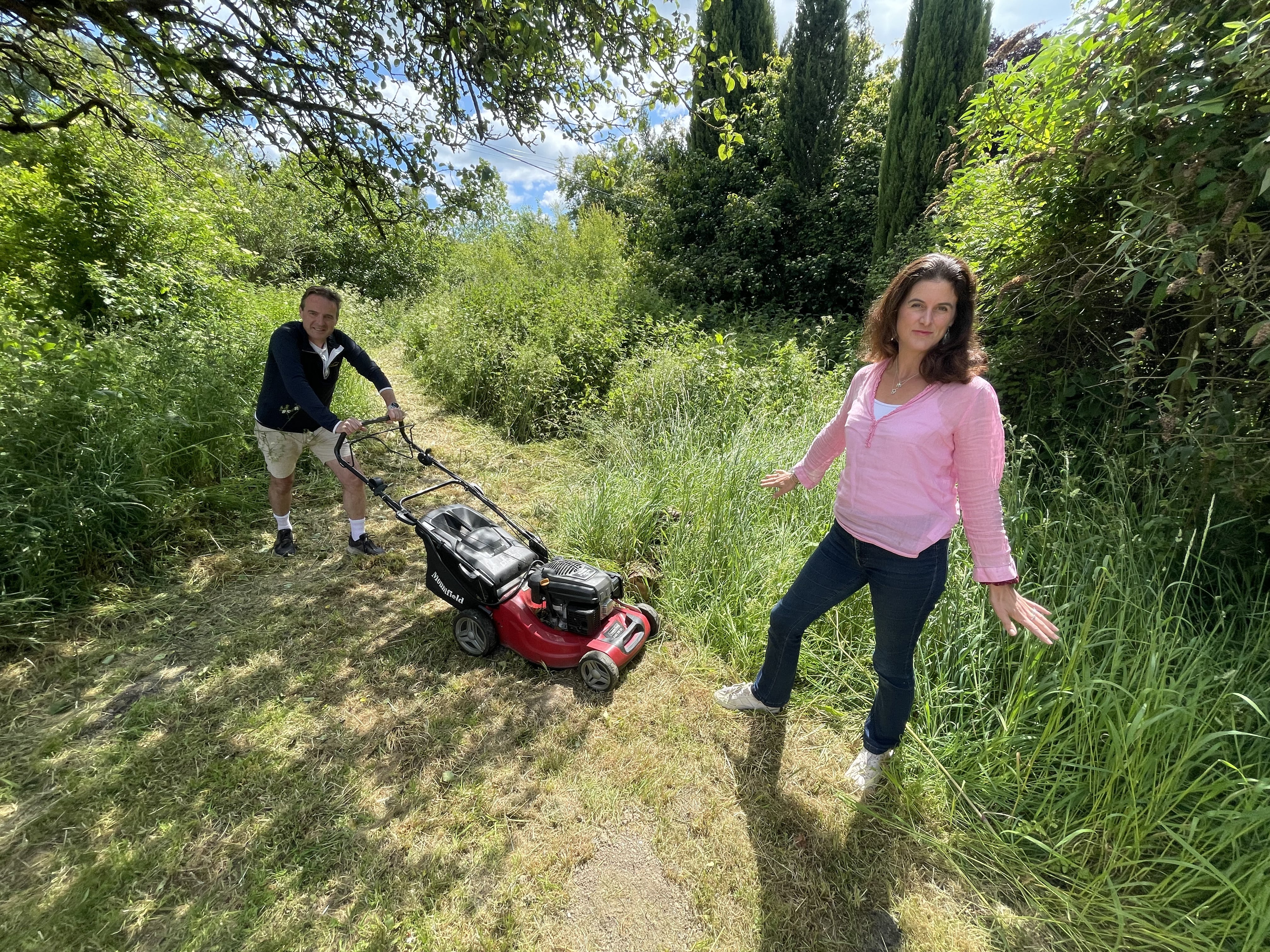Forget fights over the thermostat – ‘lawn wars’ is the new battle of the sexes
Guy Walters is a man who loves to mow and he’s married to Annabel Venning, a woman who likes her grass to grow… cue a very modern marital showdown (but who is right?)


It really does not surprise me that a recent survey by the charity Plantlife revealed that men much prefer their lawns to be well kempt. Whereas women tend to want their gardens to be a bit more rough and ready, men prefer things to be manicured and sculpted. Neat. This is certainly true of our household, in which my wife Annabel is constantly encouraging me to go easy on the mowing, and not to obsess about turning every patch of grass into a croquet lawn.
Yes, yes, I know all the arguments as to why you should not mow, and why last month we should have embraced “No Mow May”. I know it’s all to do with the birds and the bees and the insects and all that nature stuff, but that’s no more the point of a lawn than a car park or a lavatory.
The point about lawns is that our lawns are not meadows or nature reserves, they are essentially extensions of our houses. And just as you wouldn’t want a scruffy, neglected living room, you wouldn’t want that for your lawn.
The No-Mow Moaners like my wife are constantly harping on about promoting flora and fauna, but she forgets that 93 per cent of the UK is not urban. In fact, even of the urban areas themselves, 78.6 per cent consists of parks, pitches, waterways, allotments and so forth. In short, there is plenty of room on our island for nature to thrive.
In fact, domestic gardens account for just 18 per cent of that 7 per cent of developed land, so leaving your lawn to turn into a messy out-of-control jungle is statistically pointless.
Then there is the question of aesthetics. A well-mown lawn is a wonderful thing to look at. Who does not feel a sense of satisfaction at those neat stripes running up and down? Just marvel at the wonder of geometry and order imposed upon the unruliness of nature! The opposite is just too ghastly to tolerate.
When our mower was hors de combat earlier this year, the garden looked like something out of an episode of Britain’s Biggest Slobs. And yes, I’m aware that I leave my side of the bedroom like a tip, but the point about the messy bits inside a house, where guests don’t tend to go, is that nobody can see that. Much of our garden, however, is visible from a bridleway. Surface appearance matters deeply to me.
Finally, mowing is therapeutic. Just as Annabel finds hoovering the house a rewarding and uplifting experience – I can see no other reason as to why she does it so often – I find mowing a deeply transcendental experience.

It’s while pacing up and down the lawn behind the mower that I can find inner peace, not least because the noise of the engine means I cannot hear anybody summoning me. If an Englishman’s home is a castle, then the lawn is surely his inner keep, his holy of holies. It needs tending, and not be a home for nature’s riffraff. Guy Walters
‘Their sterile green deserts are only slightly better than fake grass’
Ah, those long, hazy summer days (wherever they’ve gone). Lolling on a hammock or sun lounger, listening to birds sing and bees buzz while the butterflies flit, alighting on the pretty daisies, purple clover and cheerful dandelions scattered across the lawn.
And then with a throaty roar and a deafening rumble, my husband shatters the peace by driving his tank – sorry, lawnmower – right across this Edenic scene, decapitating all those glorious flowers, sending bees and butterflies scudding for cover, silencing the birds, and infuriating me.
For several glorious months this year, we were without a lawnmower. Ours was broken (I didn’t sabotage it, honest). The garden became a spectacular wildflower meadow. The nettles mainly stayed in a corner and the grass grew tall and wavy.
Rabbits gambolled. A mother hen pheasant and her five little chicks, refugees from nearby shoots, processed through the waving rye to feed on the spills from the bird feeders.
And then – irritatingly – the mower was fixed. And paradise lost. Forget the battle of the thermostat. In our household. it’s lawn wars.
I abhor the barren green tundra to which my husband, Guy, aspires. Stripes are for carpets, not for gardens. Why expend hours of energy, noise, and fuel to try to replicate a municipal park?

Neatly mown lawns smack of suburbia. We are lucky enough to live in the countryside with a large garden. We have plenty of space for deckchairs and barbecues on the terrace, there is no need to make the grass a green patio.
The irony is that Guy is utterly unkempt when it comes to indoors. If only he wielded a hoover with the enthusiasm that he reserves for the lawnmower!
Our bedroom floor is rewilded by mountains of his shirts, his shoes proliferate across the floor. Yet, when it comes to the garden, this household slob turns into a neat freak. I think he really likes mowing as an excuse to stride around with his shirt off.
The Victorians are to blame for mowing mania. Their embrace of lawn sports – croquet, tennis, bowling and polo – required flat, grassy lawns. These were the preserve of the wealthy, who could employ armies of scythe-wielding servants.
But in 1830 a Gloucestershire man named Edwin Budding invented a wrought-iron lawn mower that could be pulled or pushed. A hundred years later, the fuel-powered lawn mower was patented in America, affordable for every suburban homeowner. And sunny Saturdays were never the same again.
But now we know better. Allowing grass to grow, with a variety of different grasses and wildflowers, enables pollinators – bees, butterflies and moths – to survive, as well as beetles, spiders and grasshoppers – important food sources for birds and other animals. But the health of the ecosystem cuts no ice with those men who give their grass a grade 1 haircut every weekend. Their sterile green deserts are only slightly better than fake grass.
But what is marriage, if not a compromise? To keep the peace, I allow Guy to mow one area of the lawn. The rest is wild, with paths through it. But if the lawnmower packs up again, don’t look at me. Annabel Venning
Join our commenting forum
Join thought-provoking conversations, follow other Independent readers and see their replies
Comments

Bookmark popover
Removed from bookmarks